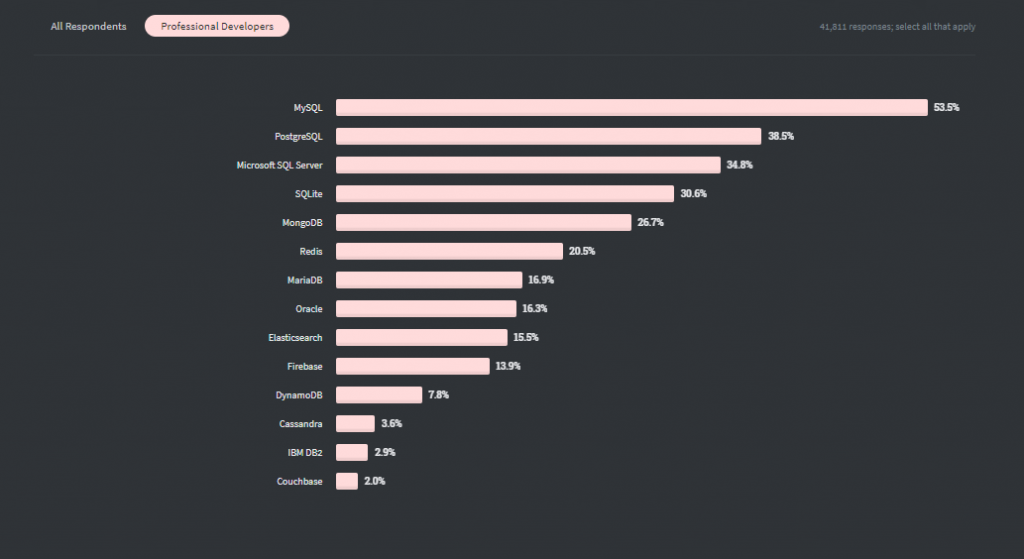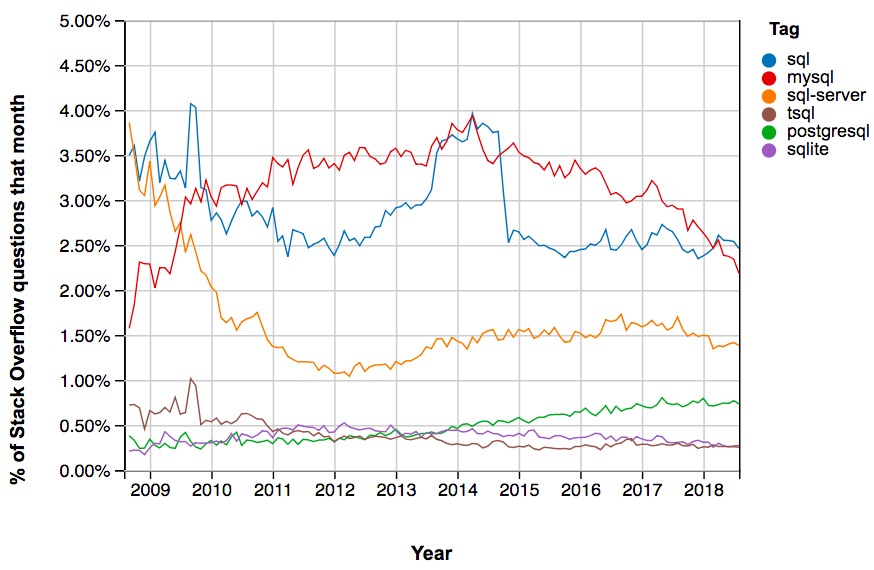A Comparison of SQL Database Flavors: How To Pick The Right SQL Database Flavor For You?
SQL, or Structured Query Language, is a database that has widespread uses with many flavors– which we will explore. As such, in our data-driven world, SQL is fast becoming an essential skill. Therefore, in this article, we will look at the most popular flavors of SQL databases individually and then compare the database flavors together. In addition, we’ll help you figure out the right choice for you; in case you want to learn more about some key basic fundamental query building structure– CRUD Operations.

Two Types: SQL vs NoSQL
There are two main types of databases: SQL and NoSQL. Before we begin, it’s important to know the differences between the two.
While SQL is a relational database that employs a table-based structure, NoSQL is a non-relational database that employs a variety of data models for accessing, retrieving and modifying database. Moreover, SQL has a predefined database schema, whereas NoSQL has a dynamically defined schema.
Additionally, the most popular flavors are mainly based on SQL rather than NoSQL— only MongoDB makes the cut in the top 5 databases in 2021—with other examples like Elastisearch, DynamoDB not used as often by developers. MongoDB is so popular because of the flexibility in offers in database design and the high performance it delivers.
The Most Popular SQL Database Flavors in 2021:
- MySQL
- PostgreSQL
- Microsoft SQL Server
- SQLite
- MongoDB
Moreover, the Stack Overflow Developer Survey 2020 has placed MySQL as the most popular database:

| Features | MySQL | PostgreSQL | MS SQL | SQLite |
| SELECT Query | SELECT col1, col2… | SELECT col1, col2… | SELECT [col1], [col2]… | SELECT col1,col2… |
| Current Date Function | SELECT CURRENT_DATE(); | SELECT CURRENT_DATE; | SELECT GETDATE()’; | SELECT date(‘now’); |
| Case Sensitive Data | No; WHERE city = ‘London’ and WHERE city = ‘london’ are the same | Yes. WHERE city = ‘London’ and WHERE city = ‘london are different | Yes. WHERE city = ‘London’ and WHERE city = ‘london are different | Yes. WHERE city = ‘London’ and WHERE city = ‘london are different |
| Column Alias | SELECT col1 AS COL | SELECT col1 AS COL | SELECT col1= COL | SELECT col1 AS COL |
| Natural Join | No | Yes | No | Yes |
| ORDER By | Allows ORDER BY; NULLs are considered lower than non-NULL values | Allows ORDER BY; NULLs are considered higher than non-NULL values | Allows ORDER BY; NULLs are considered lower than non-NULL values | Allows ORDER BY; NULLs are considered lower than non-NULL values |
| Inserting Multiple Rows | Yes | Yes | Yes | Yes |
| BOOLEAN Data Type | No; uses TinyInt(1) | Yes | No; uses BIT(1) | No; uses Int |
| Timestamp Function | Yes | Yes | No | No |
| Concatenation | concat(String 1, String 2) | String 1 || String 2 | String 1 + String 2 | String 1 || String 2 |
| List of Databases | SHOW DATABASES | SELECT datnameFROM pg_catalog.pg_database | EXEC SP_HELPDB | .databases |
| Dummy Tables | No | No | No | No |
| Window Functions | Yes | Yes | Yes | No; subqueries used. |
| Auto Increment | AUTO_INCREMENT | SERIAL | IDENTITY() | AUTOINCREMENT |
MySQL
MySQL was created in 1995 to build on the original SQL, as an open source relational database management system (RDBMS). In addition, its queries are run on the MySQL Command Line Interface (CLI) or on MySQL Workbench.
Key Features & Advantages of MySQL:
In addition, MySQL has gained immense popularity for its efficacy, ease of use, performance and powerful execution and database performance:
- Extremely fast for read-heavy workload
- Capable of replication
- Cloud-scalable database
Subsequently, let’s look at some advantages below:
- Easy to use
- Low memory leakage; memory efficient
- Runs on all OS: Windows, Mac OS, Linux, etc.
- High performance
Disadvantages of MySQL:
MySQL is one of the most used databases around the world. Still, it has some disadvantages you want to keep in mind. Let’s look at some below:
- It does not handle transaction statements effectively
- Lack of debugger tools
PostgreSQL

PostgreSQL, or commonly known as Postgres, is also an open source object-based relational database management system (RDBMS) initially released in 1996. Moreover, its queries are natively run on pgAdmin, its client. In addition, PostgreSQL is a great database language for beginners because of its broad applicability.
Key Features & Advantages of PostgreSQL:
PostgreSQL focuses on SQL compliance; in other words, it is growing into one of the most popular flavor of SQL in recent years:
- Client-server model architecture
- Offers geo-location queries
- Data integrity
- Support for JSON data types
After that, let’s take a look at some advantages now:
- Larger data storage for databases
- Multi-version concurrency control (MVCC) without read locks
- Creates views that are updatable
- Creation of user-defined functions, triggers, data types, etc.
- Runs on all operating systems: Windows, Mac, Linux, etc.
- Robust and powerful
- Huge community support
- Compatible with many programming languages like C, Python, etc.
Disadvantages of PostgreSQL:
Despite all these advantages and features, Postgres, like any other language, also has its own disadvantages. Therefore, let’s take a look at some below:
- PostgreSQL struggles in performance factors
- It is responsible for more memory utilization of computer
- Data replication is hard
Microsoft SQL Server
Microsoft SQL Server, or MS SQL, is a relational database management system developed by Microsoft in May 1989. Similarly, its queries are natively run on SQL Service Management System (SSMS). In addition, SQL Server is an important part of the Microsoft Data and Business Intelligence platforms.
Key Features & Advantages of MS SQL:
MS SQL is a language that’s growing in userbase with its widespread use. MS SQL is used by companies like Dell, Yahoo, etc. Therefore, let’s look at some key features:
- Data compression
- MS SQL is highly secure
- Its installation process is streamlined
- It offers different versions to suit personalized needs
Consequently, MS SQL is one of the most popular database languages today, so it makes sense to see some of its key advantages:
- Free for developers
- Useful online documentation
- Debugging tools on SMSS
- Great community support
- Highly secure
- Easy installation with automatic upgrades
- Easy maintenance
Disadvantages of MS SQL:
In the end, there is no database language that is perfect. Therefore, let’s explore some disadvantages of MS SQL. In other words, like any other database, MS SQL also has negative factors that may affect your choice:
- Performance tuning is hard
- There can be a bit of learning curve
- May be overwhelmed with the huge number of features offered alongside
SQLite
SQLite is a RDBMS built in C library with its primary use being in mobile applications. Unlike other databases. it is not based on client-server architecture, but rather makes use of the embedded architecture.
Key Features & Advantages of SQLite:
SQLite is gaining popularity for its features, customer service and quality. Let’s see its key features in the list below:
- Configuration doesn’t exist– no installation required
- Has an easy to use API
SQLite has a lot of advantages that we will look at now. Let’s see what these benefits are below:
- Runs on multiple OS: Windows, Linux, Mac OS etc.
- Installation not required
- Server-less database
- Flexible and fast database
- Uses less amount of memory on runtime
Disadvantages of SQLite:
In the end, SQLite has the following disadvantages that we will look at now:
- Performance compromised because of file system configuration
- Write operations are recorded
- Database file size is smaller (15MB)
MongoDB
MongoDB is a document-based database, unlike all the others on this list. As a result, it uses JSON-documents for storing data instead of tables. In addition, you can start writing query from its official editor available at this link.
Key Features & Advantages of MongoDB:
MongoDB is the most popular non-relational database because of these features:
- Data stored in JSON-documents
- Indexing used for traversal
- Horizontally scalable database
In addition, the following are its advantages:
- Flexible database schema, dynamically defined
- High speed of access time
- Easy to setup environment
Disadvantages of MongoDB:
After that, let’s look at some disadvantages:
- JOINS not allowed
- Data size is limited in MongoDB
The Right SQL Database Flavor For You Is…

In fairness, it’s difficult to choose one database generically, since each database serves a goal or purpose.
SELECT e.emp_name, AVG(s. salary) AS average_salary
FROM employees AS e
LEFT JOIN salary AS s
ON e.emp_id = s.empid
WHERE e.city = 'USA'
GROUP BY e.emp_name
ORDER BY s.salary;For instance, this code example above shows that the syntax is actually quite similar. However, it can be seen because the query output is same for MySQL, PostgreSQL and SQLite, there is not much syntactical differences.
However, Microsoft SQL Server is the one that consists of the most differences between all of them.
In other words, the right database for me may not necessarily fit or be the right one for you. As a result, each database is optimized for a specific purpose or need. Therefore, how do you know which database fits for you?
Above all, which database can you learn or base your backend in?
Then, let’s explore some key factors in helping you determine the right SQL database flavor for your needs.
Speed Of Databases:
- MySQL is fast for concurrent activities
- PostgreSQL is quite fast
- Microsoft SQL Server is slower
- SQLite is fast but not the fastest as compared to others
- MongoDB is extremely fast for data retrieval since it uses indices to traverse
Performance Of Databases:
- MySQL has limited performance optimization
- PostgreSQL is responsible for high performance database
- Microsoft SQL Server offers high performance and data compression
- SQLite runs smoothly
- MongoDB has a great performance because it relies on jsons
Database Sizes Of Databases:
- MySQL supports limited size database in some scenarios.
- PostgreSQL supports large database
- Microsoft SQL Server supports large databases
- SQLite supports big databases, but with limited file size
- MongoDB supports large databases
Eventually, you need to ask yourself what factors matter most in your needs before you can aptly choose.
Which Database Should You Choose?
If you’re looking for a fast, high performance database that will be easy to use, MySQL may be the right choice. But, if you’re working on a much larger database or complex queries— PostgreSQL may be the right choice for you.
On the other hand, if you are working with highly sensitive data, then the security, integrity and sturdiness of Microsoft SQL Server may be the perfect choice for your needs. Similarly, if you want fast, portable, and reliable database that runs on multiple operating systems, SQLite may be great.
Furthermore, if your business and data requirements are evolving over time and you need to scale accordingly, the document-based database, MongoDB could be a wonderful selection.
Conclusion to Comparison of SQL Flavors:
SQL consists of multiple flavors of databases used around the world with varying popularity. In addition, these flavors of databases carry plenty of similar traits and syntactically are akin.
Similarly, we proceeded to look at the top 5 databases in the world today individually and then compared the results together; it’s hard to pick one generically since each database serves a goal or purpose.
In conclusion, I hope you will find this post useful. Please share your thoughts in the comments below. Also, like the post if you learned something new here. Subscribe to our blog. Stay updated on all related content. Lastly, let us know your thoughts about this post in the comments. Thanks for reading. Stay safe and stay healthy.



